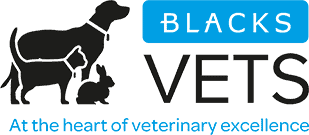May is Veterinary Nursing Awareness Month, a whole month dedicated to raising awareness of the veterinary nursing profession and the vital role they play in animal care and treatment.
Cheryl is a Registered Veterinary Nurse (RVN) here at Blacks Vets and she kindly took time out to tell us about life as a vet nurse.
I started out as a work experience student 22 years ago! This was a career change after completing further studies in business and finance and then found out that the office 9-5 wasn’t for me. I spent most of my career with the RSPCA where I trained and completed the NVQ level 3 in Vet Nursing in 2002, which meant I was finally a qualified RVN!
Since then I've worked at different practices both at home and abroad. I have spent time in Slovenia and, most recently, in Australia as an emergency and critical care nurse which I enjoyed very much. I now juggle my current role alongside looking after my children like many of my fantastic colleagues here at Blacks.
There’s no typical week as every day is different, which is what I love about my job. My main duties, day to day, including preparing the theatre and patient for surgery, assisting with taking radiographs, monitoring and ensuring patient safety whilst under anaesthetic, administering medications when asked to do so by the vet, liaising with owners over the phone, cleaning and sterilising equipment ready for the next day. Not forgetting making tea and bringing biscuits to keep spirits up on busy days!
The next step for me is to complete and obtain the Nurses Certificate in Anaesthesia by the end of 2020 as I have a special interest in anaesthesia and surgical nursing. I want to continue to learn and share knowledge with my colleagues to enable us to carry on delivering the highest level of care to our patients.
To those thinking of becoming a Veterinary Nurse, I would say that you need to be caring, compassionate, hardworking, flexible and well organised! There are hard days where you feel overwhelmed by cases and nothing seems to be going right or you’re struggling with a particular euthanasia. You will need to find ways to deal with these scenarios so that you can come into work the next day and carry on. That said, there are also many rewarding aspects of the job, I have made many close friends who I'm lucky to have also been colleagues with over the years. More importantly, seeing a pet recover and reunited with their owners is brilliant. I love it when we get little cards or messages from owners telling us how thankful they are for taking care of their pets. After all, that’s why we do what we do!
Thank you, Cheryl, for sharing your story.
To find out more about the role of RVNs in veterinary practice, or if you are interested in finding out more about a career in veterinary nursing, visit the BVNA website at www.bvna.org.uk/a-career-in-veterinary-nursing/a-career-in-veterinary-nursing.


